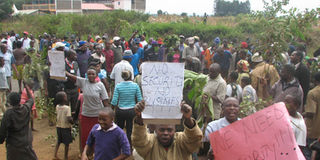Everything that could go wrong in Murang'a County has done so; which way ahead?

Residents of Maragua town hold a demonstration in the area on August 14, 2013, following a rise in insecurity. A man was killed by a three-man gang in the town and a woman kidnapped during the incident the previous night. PHOTO: Samuel Karanja / NATION.
What you need to know:
- It is now normal to see men in their 30s and 40s who are drunk throughout the day.
- Murang’a seems to have been bypassed by pioneer missionaries and as a result, no early educational facilities were set up.
- The problem was compounded by massive subdivision of land to tiny holdings that are not viable.
According to Murphy’s Law “Anything that can go wrong, will go wrong.”
In Murang’a County, everything that can go wrong has happened. Crime, social disorder, alcohol and drug abuse as well as chronic unemployment are at an all-time high. What went wrong?
Murang’a is a victim of historical omissions, geography, breakdown of the family unit and a failure by the middle class and elite who hail from the area.
Regarding history, Murang’a seems to have been bypassed by pioneer missionaries and as a result, no early educational facilities were set up.
Therefore, as Kenya approached Independence, there was no specific focus on education as a means of helping the community to rise from poverty.
Instead, the popular thing to do then was to migrate to Nairobi and engage in business.
On geography, the extreme hilly terrain has over the years made it difficult to set up infrastructure that would facilitate trade and investment. As a result, farmers in Murang’a have had limited access to markets outside the area for their produce.
Although the growing of cash crops such as tea and coffee as well as dairy farming were at one time profitable enterprises, low prices and mismanagement of these sub-sectors in the 1980s and 1990s led to high levels of poverty.
The problem was compounded by massive subdivision of land to tiny holdings that are not viable. This, coupled with a steady increase in population, led to a breakdown of the family unit.
Poor parenting, primarily caused by the absence of fathers in most homes, has led to the disillusionment of an entire generation.
The result has been early pregnancies, prostitution, as well as alcohol and drug abuse.
It is now normal to see men in their 30s and 40s who are drunk throughout the day. They consume illicit brews that make them impotent and generally harm their health.
The poverty, substance abuse and idleness have made Murang’a the natural breeding ground for criminals and other social misfits, making the county one of the most violent in Kenya.
In some neighbourhoods, criminals have turned against their own people, with kidnapping of any forward-looking individual for ransom being in vogue.
In several kidnapping incidents, the victims have been murdered in the most gruesome ways. Some have been beheaded and their heads never recovered.
In 2012, the county was placed at number 40 out of 47 in KCPE examination performance nationally. The county had done worse than many marginalised parts of the country.
I did a quick, random check of the results in a few primary schools and was shocked to learn of schools where the best performing student had 230 marks.
Many do not transit to secondary schools, and therefore join a huge army of desperados in the villages that have sunk into the subculture of crime, violence and social decay.
Regarding the failures by the middle class and elite, most of us are not investing back home. Instead, our investments, especially in real estate and industry, are in Nairobi and its outskirts.
This has robbed Murang’a of the opportunity to create jobs for young people and grow the economy.
So what can we all do to save Murang’a from further decline? I would suggest three things.
The first is that Murang’a must find its moral compass. The Church and other religious organisations need to condemn the vices that have taken root in the county.
Moreover, children need to be exposed to religious teachings early in their lives to ensure they are not easily indoctrinated by subversive groups. In addition, parents, especially fathers need to play a role in the upbringing of their children.
Secondly, those of us who come from Murang’a need to begin investing back home. In whatever way we can, we need to ensure that we put money into trade and investment activities in our rural communities.
This will ensure that youths have meaningful work to do.
We should also spend time with the young people in primary and secondary schools and share with them the role that education has played in our career or business achievements.
Let us share with them our victories and lessons from the mistakes we have made.
Finally, infrastructure should be put in place to increase connectivity in and out of the county. Roads, railways, bridges, and broadband will go a long way in aiding the movement of goods and people as well as facilitating trade. Infrastructure development will also attract domestic and foreign investors to Murang’a.
This is a challenge to everyone who originated from Murang’a or who has any attachment to this bleeding, wounded giant.
Mr Kihara is a senior official at the Office of the President. ([email protected])




